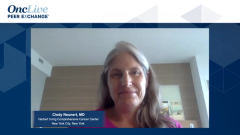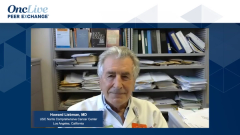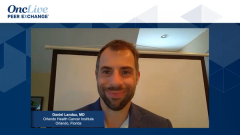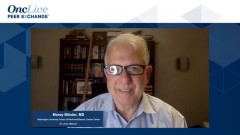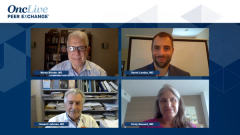
Chronic Immune Thrombocytopenia: Considerations for Fostamatinib Therapy
Expert perspectives on the selection and use of fostamatinib as second-line therapy in patients with immune thrombocytopenia.
Episodes in this series

Transcript:
Morey Blinder, MD:Let’s move on to the next drug in this family of potential second-line therapies. Let’s talk about fostamatinib, the newest of these second-line therapies. Where does it fit in? I’ll just share my experience, which is not too extensive with fostamatinib, but I think now in retrospect, it’s probably because I tended to use it after many other lines of therapy, and so it was a self-fulfilling prophecy. It was not working well because it was not used very early in therapy and that’s probably 1 hallmark. The earlier therapies will work better. Howard, do you want to comment on fostamatinib?
Howard Liebman, MD: Yes. I think that the concept of inhibiting the so-called SYK pathway is great. The problem is that, when in the trials, you go at 100 twice a day early on. The data are there that say if you don’t see a response to 100 twice a day, which has fewer adverse effects, being hypertension and diarrhea, and when you go to the 150 twice a day, you don’t respond. They have shown that there was a dose response, but there was also a toxicity response. I was willing early on to try it in patients, but I saw literally very few. Interestingly, I have used it in Evans syndrome, which brings up another aspect. It did a very good job of preventing relapses in the hemolytic anemia, which relates to some data that have come out about its use and a phase 3 study coming out with its use in hemolytic anemia. I don’t consider it a strong option right now with the few patients. One of my colleagues has a patient who’s been effectively controlled now for almost a year and a half having gone through Rituxan and steroids and the rest. That’s really about the only long-term response that I’ve seen in our experience here. Again, if you look at the original trial, it’s 18% based upon their persistent response above 50,000. That’s a pretty low outcome challenge, but it does have some efficacy in some patients, but I think there are newer drugs and newer targets that potentially can give you what fostamatinib gives you and give you some other immune modulation, as well. That’s the BTK [Bruton tyrosine kinase] inhibitors, because SYK has to run through the BTK enzyme to drive phagocytosis. If the BTK inhibitors proved to be effective in their trials, and there’s some hint that they do show a very early response to…inhibiting phagocytosis, they may become equivalent to using Rituximab or TPO [thrombopoietin] agonists in that line, and the rest, early on in the disease.
Morey Blinder, MD:I think that’s an interesting perspective. Cindy, have you seen Evans syndrome respond to fostamatinib, or do you have much experience with that that you might want to comment on?
Cindy Neunert, MD: No, we do not have access to fostamatinib yet in the pediatric population. They may not go for an indication in pediatrics because I think there’s key turnover cartilage and bone development and things that may make it prohibitive in the pediatric population. I glean from my adults, in case I do encounter that 17-, 18-year-old, but I think the adverse effects may not be very tolerable in that population, either and I think they’d be likely to stop therapy.
Howard Liebman, MD: I want to add on, Morey, that…it’s been very good in controlling hemolytic anemia, but we’ve seen ITP break through in those patients. Like Evans, they’ll go one to the other. We do screen for ALPS [autoimmune lymphoproliferative syndrome] and common variable immunodeficiency in all our adults, and even though it’s thought to be less, the only ones we don’t screen are the ones who also have lupus, which we know is probably a second cohort of them. So it is a different issue in adults, but I thought it was interesting that it really prevented hemolytic relapses. For that reason, I’m waiting to see what the data show on the hemolytic anemia trials.
Morey Blinder, MD:I think those studies are ongoing.
Transcript edited for clarity.


